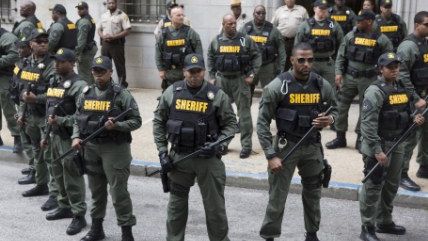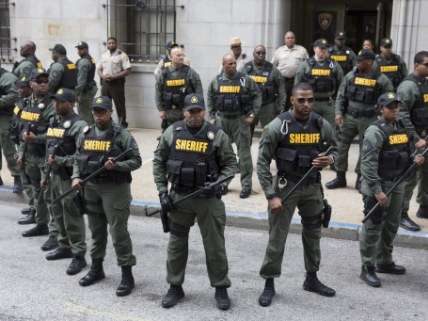When Police 'Use of Force' Updates Are Anything But
Former Baltimore Police officer blasts reforms as just more of the same.


In the wake of the unrest in Baltimore following Freddie Gray's death at the hands of the police department, the mayor and police announced "reforms" to their use of force policies.
The Baltimore Sun noted these reforms, the first since 2003, would emphasize the "sanctity of life" and de-escalation techniques and urges officers to intervene when other officers step out of line. Ed Krayewski took a critical eye to the changes last week.
But if these reforms seem like the kind of commonplace practices police departments should already have, it might because they already do. Michael Wood, a former Baltimore Police sergeant, took to the pages of the Baltimore Sun to point out that many of these reforms are already existing policies just being repackaged:
- The new policy reportedly emphasizes the "sanctity of life." Yet the 2003 policy states "protecting life" is the BPD's highest priority, and 1993 General Order C-5, entitled "The Values of the BPD," states "our highest commitment is protecting life."
- The new policy stresses de-escalation. But this has long been stressed in police training and police policy around the country, including in the BPD. The Sun wrote about statewide efforts to defuse violent situations with "verbal judo" 16 years ago, and former BPD commissioner Kevin Clark pushed the same policies during his tenure more than a decade ago.
- The new policy requires reporting when officers point firearms or flash a Taser's electrical current without firing it. Yet the 2003 use of force policy says an officer must "immediately notify your supervisor whenever you use reportable force," which includes "any use" of an Air Taser. And pointing a firearm at something you do not intend to shoot is a violation of firearms safety 101; no accredited police training teaches otherwise. This has always been a violation, thus the disciplinary action last year against an officer for pointing his gun at dirt bike riders in Druid Hill Park, and the five-year prison sentence handed down in January for Prince George's County Police Officer Jenchesky Santiago, who was convicted of assault for pointing his firearm at a man's head.
- The new policy requires calling for a medic when necessary. A 2007 policy states that law enforcement shall "attend to the well-being of any injured member and/or civilian," and "ensure injuries to members and civilians are documented." For injuries to prisoners, see the reporting requirements in accordance with General Order K-14, "Persons in Police Custody." Going all the way back to 1997, it states officers must "ensure the safety of the arrestee" and "ensure medical treatment." This 1997 order also states that "the arrestee is secured with seat/restraint belts provided."
When we see these new cases that suggest over-the-top use of force responses with Philando Castle and Alton Sterling, it's a reminder that as much as the powers that be seem to cling to these solutions, from local municipalities all the way up to the Department of Justice, rarely is the problem that police departments don't have proper policies to curtail abuse. Rather, they either lack the will or there are too many barriers, often imposed by union agreements, that keep police officers from being held accountable for bad behavior.
Granted, it's true that the officers in Gray's case are being cleared by the justice system and their behavior has not been ignored. They faced trial and were not convicted. Many are probably unhappy with the outcome given the circumstances.
But beyond the criminal justice system there's still the issue that it's very hard to hold police officers accountable, period, because of rules that protect them from interviews at the time when a use of force incident happens, because of contracts that make it very hard to remove bad police officers who make poor decisions, and because of laws that conceal police officers from transparency about their previous conduct. Should we have to literally convict a bad police officer of a crime in order to remove him or her from the force?
Since there does not appear to be the will to fix those problems or the ability to counter the political power of police unions in municipalities, we get an obsession with "policies," as though that's the problem. The method by which government employees are able to protect themselves at the expense of public safety is the problem.


Show Comments (26)